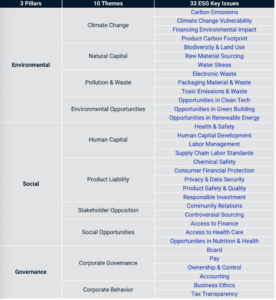In the contemporary business landscape, Environmental, Social & Governance (ESG) scores have become instrumental in guiding investment decisions. ESG scores are not just abstract values. Rather, they are measurable indicators of a company’s commitment to ethical, environmental, and societal values. While ESG performance increasingly provides companies with preferential financial opportunities, here we will focus on its pivotal role in channeling fund flows into publicly traded securities, with an emphasis on the environmental component.
ESG Funds:
Many investment firms have launched ESG oriented funds where ESG scores are factored into the fund’s investment criteria alongside traditional evaluation criteria. Investment firms globally are recognizing the intrinsic value embedded in ESG criteria/performance. A proliferation of ESG-centric funds underscores this trend. These funds integrate ESG metrics into their investment algorithms alongside traditional financial analysis parameters. Companies boasting robust ESG credentials not only gain entry into these exclusive funds but can also secure preferential weighting akin to entities with substantial market capitalization in conventional indices like S&P 500 or Nasdaq 100. Companies that do not have adequate ESG scores are excluded from being a investment in the fund.
Intersection of ESG Scores and Investment Funds:
Traditional investment management companies increasingly offer ESG-oriented ETFs, commanding billions of dollars of assets under management. BlackRock manages around $3.3 Bn in its U.S.-based ESG ETF alone. Vanguard has over $8.4 Bn in assets under management in its ESG U.S. Stock ETF. Many asset managers now offer myriad types of ESG-oriented funds. For example, BlackRock has 42 different funds classified as falling under the ESG banner. Each fund has a particular focus on one component of ESG or another. Each fund has its own set of criteria when evaluating potential component companies. For instance, Charles Schwab outlines the common criteria for ESG ETFs as follows:

Role of Index Companies:
So, who determines which companies are ESG friendly so that my company can become a component of an ESG fund? Asset managers often assess the viability of including a company in their fund based on the ratings of indexing companies such as MSCI and S&P which specialize in researching and indexing companies based on their characteristics. The indices provided by indexing companies serve as benchmarks, enabling investors to compare their sustainability criteria against relevant market standards. The indexes themselves act as performance benchmarks and the basis for passive investment funds such as ETFs. Indexing companies aggregate ESG research across a broad swath of equities and rank them based of their performance in an index, making it easy for investors and funds to make ESG investment decisions.
Achieving Higher ESG Scores:

Therefore, a good first step to scoring higher is to understand how groups like MSCI evaluate companies and assign ESG scores. Once companies understand their rubric, they can focus their efforts to qualify for these increasing popular indices. MSCI evaluates companies on a selection of Environmental, Social, and Governance Key Issues. Relevant issues for a given company are selected based on the company’s exposure to potentially material ESG risks, driven by industry-specific and market-specific factors. Each Key Issue is scored from 1-10, evaluating the company’s exposure to risks or opportunities and its ability to manage that exposure.
Strategic Alignment with Solar Energy:
Strategic solar energy projects can be pivotal for companies aiming to ascend the indexing companies’ rankings swiftly and secure a position in ESG ETFs. New Columbia Solar understands the importance of ESG rankings from a financial perspective and would like to help your firm craft a strategy to increase its ESG rankings. Our offerings are purely accretive to all stakeholders, and therefore allow companies to bolster their ESG profile. Further New Columbia Solar offers Solar as a Tenant (SaaT) and Power Purchase Agreement (PPA) structures which are zero Capex ways to effectuate solar.
About New Columbia Solar
New Columbia Solar is a Washington, DC-based solar energy company, financier, owner, and operator of commercial and industrial solar energy facilities. Founded in 2016, the company y has grown to be the largest and most comprehensive solar energy company in the District of Columbia. Our mission is to help landlord’s and their surrounding communities take advantage of renewable energy and the profits and energy resiliency it provides. For more information, visit: www.newcolumbiasolar.com
Email: [email protected]
